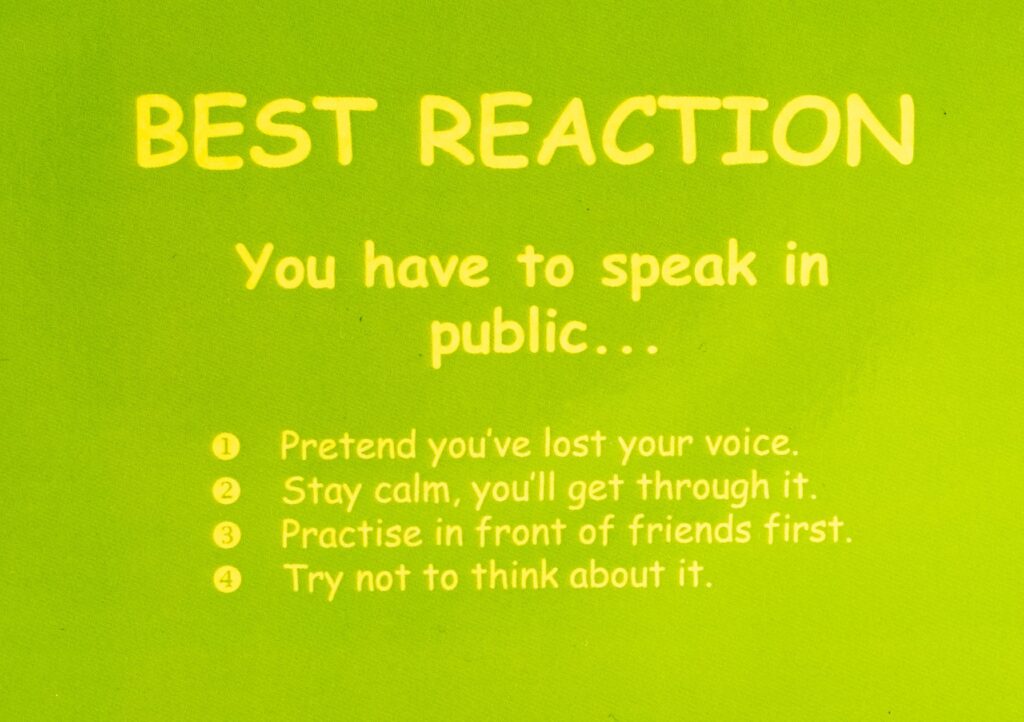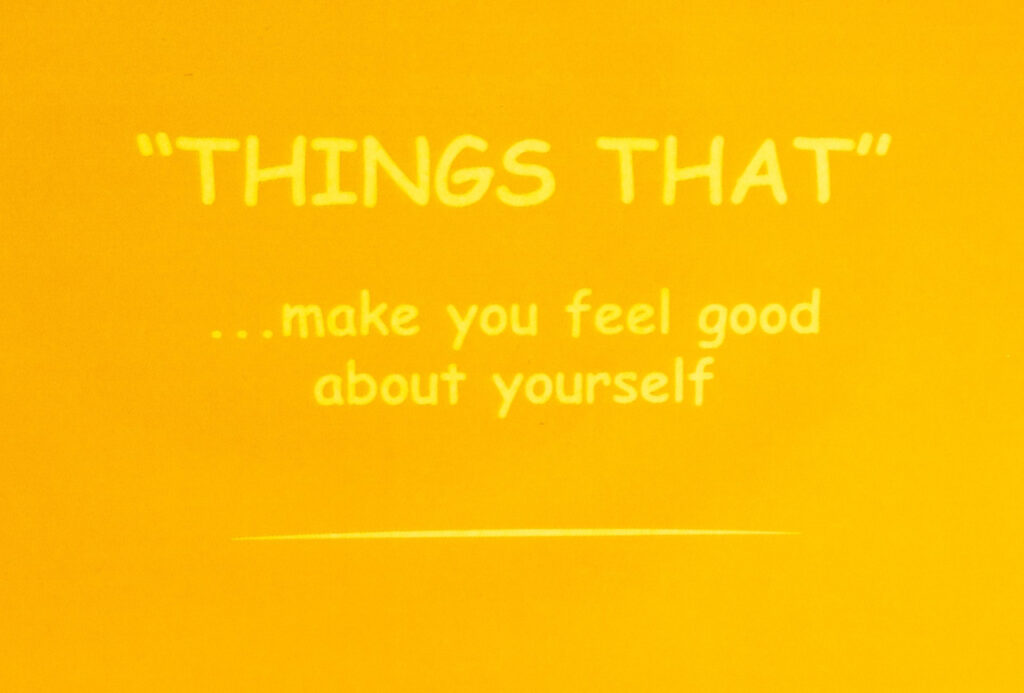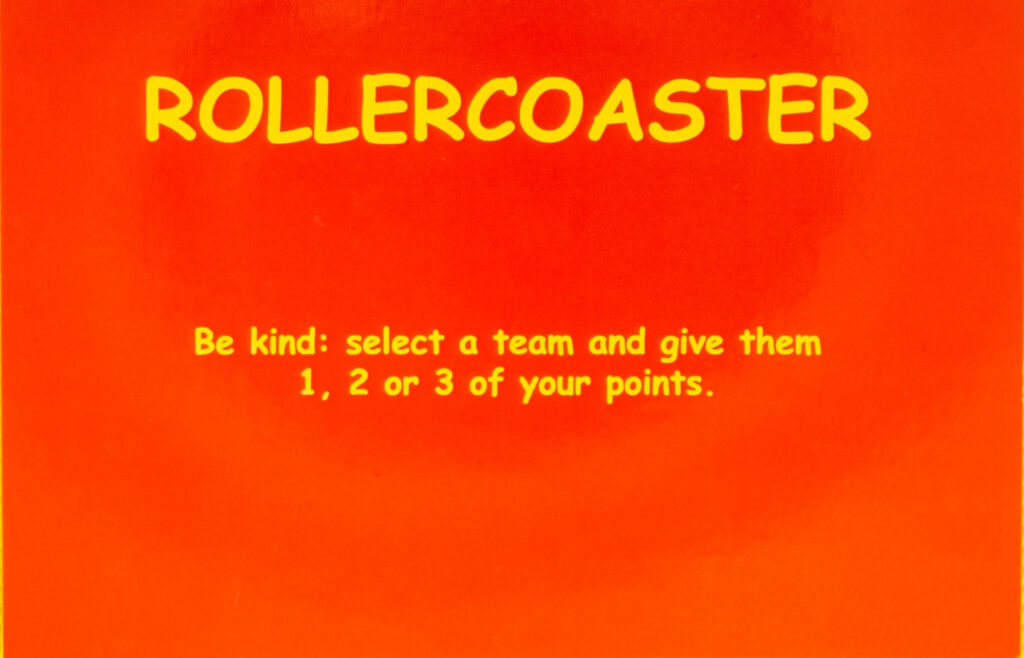Say What? Card Game

Say What? is a fun card game, expertly designed to help everyone, from children to adults,
develop more resilience.
 The green Best Reaction cards encourage players to make the right choices – the rational, calm ones that resilient people know how to make even in difficult times. These cards describe a challenging situation and offer four potential responses to the situation. Teams win a point if they correctly identify the resilient response, i.e. the one which will generate the best outcome for you in the long term rather than the knee-jerk reaction or the easy option. (Players who have also completed the Resilience e-learning training can be asked to identify the “Puppy Reaction”, namely the response we have when our emotions get the better of us)Life is hard, it has its ups and downs. Some days are good, some days not so good. If you’re a person who has challenges in life, then you need to develop resilience.
The green Best Reaction cards encourage players to make the right choices – the rational, calm ones that resilient people know how to make even in difficult times. These cards describe a challenging situation and offer four potential responses to the situation. Teams win a point if they correctly identify the resilient response, i.e. the one which will generate the best outcome for you in the long term rather than the knee-jerk reaction or the easy option. (Players who have also completed the Resilience e-learning training can be asked to identify the “Puppy Reaction”, namely the response we have when our emotions get the better of us)Life is hard, it has its ups and downs. Some days are good, some days not so good. If you’re a person who has challenges in life, then you need to develop resilience.
 The yellow Things That cards are designed to vary the pace of the game. Each card requires players to name in 60 seconds for example, 10 things that they are grateful for, 10 things that make you know you’re loved, etc. The Facilitator can choose how many things must be named in what time frame (this allows for flexibility for different age groups and team sizes).
The yellow Things That cards are designed to vary the pace of the game. Each card requires players to name in 60 seconds for example, 10 things that they are grateful for, 10 things that make you know you’re loved, etc. The Facilitator can choose how many things must be named in what time frame (this allows for flexibility for different age groups and team sizes).
 The red Rollercoaster cards symbolise the fact that life is a rollercoaster; it has its ups and downs, and often we are not in control of the difficulties life throws at us. Resilient people are skilled at dealing with these adversities and take them in their stride. The Rollercoaster cards award or deduct points randomly, just as life sometimes rewards us and sometimes disappoints us. They are also linked to areas of resilience such as empathy, kindness, etc., referencing things such as food banks, charities, and the homeless.
The red Rollercoaster cards symbolise the fact that life is a rollercoaster; it has its ups and downs, and often we are not in control of the difficulties life throws at us. Resilient people are skilled at dealing with these adversities and take them in their stride. The Rollercoaster cards award or deduct points randomly, just as life sometimes rewards us and sometimes disappoints us. They are also linked to areas of resilience such as empathy, kindness, etc., referencing things such as food banks, charities, and the homeless.
What are its benefits?
- Helps you to learn about resilient choices in life
- Promotes key elements of resilience, for example, harmony, empathy, kindness, appreciation and gratitude
- Gets you thinking about how you react to challenges in life
- Gives you an opportunity to think about what daily challenges you would include on your own personal cards
- Allows you to learn while having fun
How does it work?
The game is designed to be played in teams. The number of players per team can vary according to needs, and we generally recommend a maximum total of 20 players (unless there are no crowd control issues!). Teams of 2-5 players all work well. The aim of the game is to win as many points as possible. A Facilitator organises the game and decides how long to play for, but their main role is to decide whether or not points should be awarded when responding to the cards. (There are rule cards which explain how to play the game). The Say What? cards have been designed in collaboration with experts to promote key areas of resilience such as kindness, empathy, gratitude, the ability to recognise your strengths and keep going when times are tough, impulse control, and making the best choices rather than the easy ones. There are 3 types of cards coloured green, yellow and red – Best Reaction, Things That and Rollercoaster. The green Best Reaction cards encourage players to make the right choices – the rational, calm ones that resilient people know how to make even in difficult times. These cards describe a challenging situation and offer four potential responses to the situation. Teams win a point if they correctly identify the resilient response, i.e. the one which will generate the best outcome for you in the long term rather than the knee-jerk reaction or the easy option. (Players who have also completed the Resilience e-learning training can be asked to identify the “Puppy Reaction”, namely the response we have when our emotions get the better of us)Life is hard, it has its ups and downs. Some days are good, some days not so good. If you’re a person who has challenges in life, then you need to develop resilience.
The green Best Reaction cards encourage players to make the right choices – the rational, calm ones that resilient people know how to make even in difficult times. These cards describe a challenging situation and offer four potential responses to the situation. Teams win a point if they correctly identify the resilient response, i.e. the one which will generate the best outcome for you in the long term rather than the knee-jerk reaction or the easy option. (Players who have also completed the Resilience e-learning training can be asked to identify the “Puppy Reaction”, namely the response we have when our emotions get the better of us)Life is hard, it has its ups and downs. Some days are good, some days not so good. If you’re a person who has challenges in life, then you need to develop resilience.
 The yellow Things That cards are designed to vary the pace of the game. Each card requires players to name in 60 seconds for example, 10 things that they are grateful for, 10 things that make you know you’re loved, etc. The Facilitator can choose how many things must be named in what time frame (this allows for flexibility for different age groups and team sizes).
The yellow Things That cards are designed to vary the pace of the game. Each card requires players to name in 60 seconds for example, 10 things that they are grateful for, 10 things that make you know you’re loved, etc. The Facilitator can choose how many things must be named in what time frame (this allows for flexibility for different age groups and team sizes).
 The red Rollercoaster cards symbolise the fact that life is a rollercoaster; it has its ups and downs, and often we are not in control of the difficulties life throws at us. Resilient people are skilled at dealing with these adversities and take them in their stride. The Rollercoaster cards award or deduct points randomly, just as life sometimes rewards us and sometimes disappoints us. They are also linked to areas of resilience such as empathy, kindness, etc., referencing things such as food banks, charities, and the homeless.
The red Rollercoaster cards symbolise the fact that life is a rollercoaster; it has its ups and downs, and often we are not in control of the difficulties life throws at us. Resilient people are skilled at dealing with these adversities and take them in their stride. The Rollercoaster cards award or deduct points randomly, just as life sometimes rewards us and sometimes disappoints us. They are also linked to areas of resilience such as empathy, kindness, etc., referencing things such as food banks, charities, and the homeless.
What do people like about the game?
It injects fun into a training session, as well as reinforcing the difference between “knee-jerk” behaviours and resilient behaviours. The versatility of the game makes it attractive because it can be played 1:1, with small groups or large groups. After playing the game just once, both corporate delegates and school pupils have enjoyed creating their own Best Reaction cards tailored to the challenges they face to their own Resilience on a daily basis. Life is a rollercoaster. So why not learn how to deal with its ups and downs, and have some fun at the same time?- Ages 8+
- 2-6 players
- 30 – 60 minutes playing time
- 100 x cards
- 1 x Instructions
